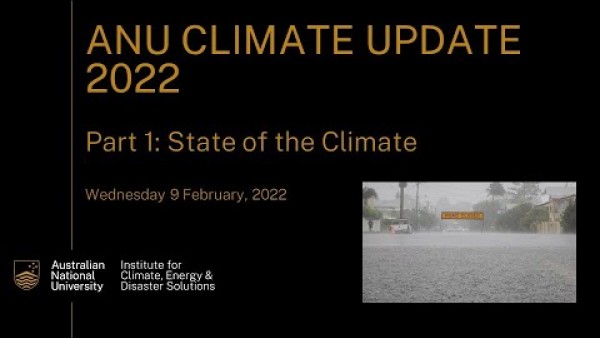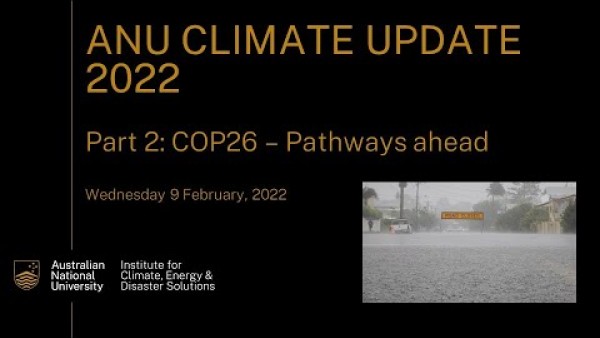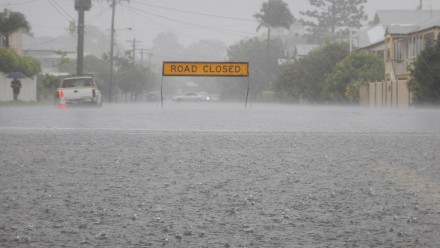ANU Climate Update 2022
ANU Climate Update 2022 will present an overview of how our climate is changing and how we are responding to these changes in Australia and around the world.
Part 1 will summarise the latest climate research, including a snapshot of newly released data on how our climate changed in 2021.
Part 2 will discuss the implications of the latest round of UN climate negotiations, COP26, held in Glasgow in November 2021. Presentations will focus on three critical issues – namely targets for emission reduction by 2030, how we can adapt to climate change in Australia and options for addressing climate change related loss and damage, particularly for developing economies.
This annual event brings together experts, policymakers, students, industry and the community to discuss the state of our climate and what can be done to tackle climate change.
This event will be held online.
Aquifer - February - May 2022
ANU Climate Update is part of a Territory-wide program of dialogue, events and exhibitions responding to the current climate crisis:
Aquifer: Art + Climate + Water
Aquifer brings a Territory-wide focus to activate conversations on the impacts of climate change drawing attention to our citizen responsibilities to act now at a time when the global pandemic dominates media cycles. Local and interstate artists and galleries from across Canberra have joined forces to engage in the climate crisis dialogue - for more information and to explore the Aquifer program across Canberra, click here.
Program - ANU Climate Update 2022
Part 1 - State of our Climate – 3-4pm
Global Climate Overview 2021 - Prof Mark Howden, Director, The Australian National University Institute for Climate, Energy & Disaster Solutions. DOWNLOAD PRESENTATION.
Moderator - Dr Helen Cleugh, Post Retirement Fellow, Commonwealth Scientific and Industrial Research Organisation (CSIRO); and Honorary Professor, The Australian National University Institute for Climate, Energy & Disaster Solutions
Audience Q&A
Break – 4-4.15pm
Part 2 – COP26 – Pathways Ahead – 4.15-5.45pm
Climate mitigation – Why are 2030 emissions reductions targets so important? – Kate Donnelly, Master of Climate Change student, The Australian National University. DOWNLOAD PRESENTATION.
Climate change loss and damage – Dr Melanie Pill, former PhD student, Fenner School of Environment & Society, The Australian National University. DOWNLOAD PRESENTATION.
Climate adaptation – What would an effective national climate adaptation strategy look like? – Prof Jamie Pittock, Fenner School of Environment & Society, The Australian National University. DOWNLOAD PRESENTATION.
Moderator - Dr Roslyn Prinsley, Head of Disaster Solutions, The Australian National University Institute for Climate, Energy & Disaster Solutions
Followed by audience Q&A
About the speakers
Prof Mark Howden is Director of the The Australian National University Institute for Climate, Energy & Disaster Solutions. Mark has worked on climate related issues for over 30 years in partnership with many industry, community and policy groups. He has been a major contributor to the Intergovernmental Panel on Climate Change (IPCC) since 1991 and is now an IPCC Vice-Chair.
Kate Donnelly is currently studying towards a Master of Climate Change at The Australian National University and also works as a climate analyst in the superannuation sector. She has previously worked on climate change adaptation projects in Fiji and Tuvalu, and as part of a national delegation to the Conference of the Parties of the United Nations Framework on Climate Change.
Melanie Pill is a social and political scientist who has finished her Doctorate on financing loss and damage from climate and international negotiations. Prior to that she has worked for various federal and state environment departments on policies and strategies for climate change adaptation and mitigation, renewable energy and energy efficiency. Melanie also holds a Masters in Environmental Management and Development from the Crawford School of Public Policy.
Prof Jamie Pittock is an expert on climate change adaptation, water management and the intersection of biodiversity, climate change, energy, food and water policies at the Fenner School of Environment & Society. Prior to joining The Australian National University, Jamie worked for several environmental non government organisations in Australia and internationally. He is a member of the Wentworth Group of Concerned Scientists.
Dr Helen Cleugh is an atmospheric scientist whose career has spanned research discovery, delivery and leadership. She was appointed as a CSIRO Research Scientist in 1994, where she became a senior leader of CSIRO’s climate and atmospheric research and then served as the inaugural Director of CSIRO's Climate Science Centre from 2017 to 2020. Her research explores the influence of land-air interactions on climate, carbon uptake and water availability, and how this affects carbon and water resource management, environmental outcomes, and climate. Dr Cleugh is a Fellow of the Australian Academy of Technology and Engineering (ATSE) and the Australian Meteorological Society (AMOS). She has been a member of the World Climate Research Programme’s Joint Scientific Committee since 2015 and is currently the Vice Chair.
Dr Roslyn Prinsley is the Head, Disaster Solutions at the ANU Institute for Climate, Energy and Disaster Solutions and Head, Strategic Research Initiatives, in the Office of the Deputy Vice Chancellor, Research and Innovation at the Australian National University. She recently initiated and developed the ANU Bushfire Initiative. She was previously the National Adviser for Science and Mathematics Education and Industry in the Office of the Chief Scientist. Roslyn has had an extensive career leading research both nationally and internationally in natural resource management, agriculture and bioenergy. She has published over 90 books and reports.
Event registration privacy notice.
Image: Shutterstock










